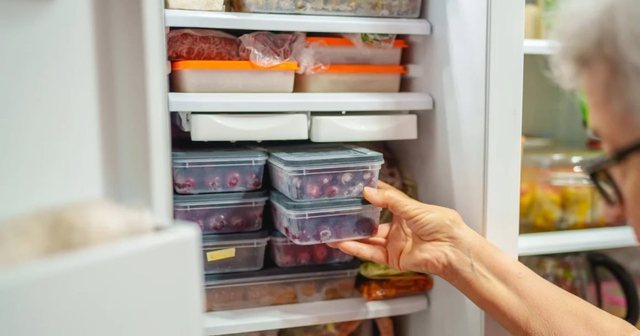
CNN: Study finds common household plastic linked to thousands of global deaths from heart disease


Synthetic chemicals called phthalates, found in consumer products such as food storage containers, shampoo, makeup, perfume and children's toys, may have contributed to more than 10% of all global heart disease deaths in 2018 among men and women aged 55 to 64, a new study has found.
CNN writes that “Phthalates contribute to systemic inflammation in the coronary arteries, which can accelerate existing disease and lead to acute events, including mortality,” said lead author Dr. Leonardo Trasande, professor of pediatrics and population health at New York University’s Grossman School of Medicine.
He is also director of NYU Langone's Division of Environmental Pediatrics and Center for Environmental Hazard Investigation.
"Phthalates are known to disrupt testosterone balances," Trasande said, adding that in men, "low testosterone is a predictor of adult cardiovascular disease."
In previous studies, phthalates have been linked to reproductive problems, such as genital malformations and undescended testicles in young boys, as well as lower sperm counts and lower testosterone levels in adult men. Studies have also linked phthalates to asthma, childhood obesity, and cancer.
“The new study highlights the potentially large health and economic burden of exposure to DEHP, which is consistent with existing concerns about its risks,” David Andrews, acting scientific director at the Environmental Working Group, a consumer organization that monitors exposure to phthalates and other chemicals in plastics, said in an email. He was not involved in the study.
The American Chemistry Council, which represents the industry, declined to comment on the study, but told CNN via email that the organization's High Phthalate Panel is committed to promoting the benefits of high phthalates like DINP and DIDP.
Exposure and risk to phthalates
Often called "the ubiquitous chemical" because they are so common, phthalates are added to consumer products, such as PVC plumbing pipes, vinyl flooring, rain and stain-resistant products, medical tubing, garden hoses, and some children's toys to make the plastic more flexible and harder to break.
Other common exposures come from the use of phthalates in food packaging, detergents, clothing, furniture, and automotive plastics.
Phthalates are also added to personal care items like shampoo, soap, hairspray, and cosmetics to make fragrances last longer.
Njerëzit ekspozohen kur thithin ajër të kontaminuar ose hanë ose pinë ushqime që bien në kontakt me plastikën, sipas Qendrave të SHBA-së për Kontrollin dhe Parandalimin e Sëmundjeve .
Studimi i ri, i botuar të martën në revistën eBiomedicine, shqyrtoi ndikimin e një ftalati – Di(2-etilheksil)ftalati , ose DEHP – në vdekjet globale në 200 vende dhe territore.
Studiuesit analizuan të dhëna shëndetësore dhe mjedisore nga dhjetëra anketa të popullsisë, të cilat përfshinin mostra urine që përmbanin produkte të zbërthimit kimik të lëna nga DEHP, i cili dihet se është i lidhur me sëmundjet kardiovaskulare , tha Trasande.
Di(2-etilheksil)ftalati është lidhur gjithashtu me defektet e lindjes, kancerin dhe dëmtimet riprodhuese tek burrat, sipas Propozimit 65 të Kalifornisë , një ligj që u kërkon kompanive të vendosin etiketa paralajmëruese në produktet që njoftojnë konsumatorët rreth efekteve të mundshme shëndetësore të kimikateve.
Studiuesit e krahasuan ekspozimin me statistikat e vdekjeve të mbledhura nga Instituti për Metrikat dhe Vlerësimin e Shëndetit, një grup kërkimor amerikan që mbledh informacion mjekësor global.
Analiza zbuloi se ekspozimi ndaj DEHP kontribuoi në 368,764 vdekje në vitin 2018 midis burrave dhe grave të moshës 55 deri në 64 vjeç në nivel global. Afrika përbënte 30% të vdekjeve nga sëmundjet e zemrës të lidhura me DEHP, ndërsa Azia Lindore dhe Lindja e Mesme përbënin 25% të vdekshmërisë, zbuloi studimi.
Hulumtimi besohet të jetë vlerësimi i parë global i çdo rezultati shëndetësor nga ekspozimi ndaj DEHP, tha autorja kryesore e studimit Sara Hyman, një shkencëtare e asociuar kërkimore në Shkollën e Mjekësisë Grossman të NYU-së.
“Duke theksuar lidhjen midis ftalateve dhe një shkaku kryesor i vdekjes në të gjithë botën, gjetjet tona i shtohen sasisë së madhe të provave se këto kimikate paraqesin një rrezik të jashtëzakonshëm për shëndetin e njeriut”, tha Hyman në një deklaratë.
Një kufizim i hulumtimit, megjithatë, rrjedh nga përdorimi i raporteve të rrezikut në SHBA për të vlerësuar vdekjet e atribuueshme popullsisë në vende të tjera, tha Andrews i EWG.
“Ndërsa autorët e pranojnë këtë kufizim, ata supozojnë se marrëdhënia midis ekspozimit ndaj DEHP dhe sëmundjeve kardiovaskulare është e qëndrueshme në nivel global”, tha ai në një email.
“Kjo mund të mos jetë e vërtetë duke pasur parasysh ndryshimet e rëndësishme si në nivelet e ekspozimit ashtu edhe në aksesin në zbulimin dhe trajtimin e sëmundjeve kardiovaskulare në të gjitha vendet.”
Një studim i mëparshëm mbi ftalatet analizoi të dhënat e SHBA-së
Hulumtimet e mëparshme nga Trasande dhe ekipi i tij matën përqendrimin e ftalateve në urinë te më shumë se 5,000 të rritur në Shtetet e Bashkuara dhe i krahasuan këto nivele me rrezikun e vdekjes së parakohshme gjatë një mesatareje prej 10 vitesh.
Në atë studim , studiuesit zbuluan se ftalatet mund të kontribuojnë në rreth 91,000 deri në 107,000 vdekje të parakohshme në vit midis amerikanëve të moshës 55 deri në 64 vjeç .
According to the study, people with the highest levels of phthalates had a greater risk of death from any cause, especially cardiovascular mortality.
The results held true even after researchers controlled for pre-existing heart disease, diabetes, cancer and other common conditions, poor eating habits, physical activity and body mass, as well as levels of other known hormone disruptors, such as bisphenol A, or BPA.
Researchers estimated that these deaths could cost the United States about $40 to $47 billion each year in lost economic productivity.
Experts say it is possible to minimize exposure to phthalates and other endocrine disruptors.
"Avoid plastic as much as you can. Reducing your consumption of ultra-processed foods can reduce your exposure levels to the chemicals you come into contact with," Trasande said.
"Never put plastic containers in the microwave or dishwasher, where the heat can break down the coating so they can absorb moisture more easily."
Here are some other tips to reduce exposure:
Use unscented lotions and laundry detergents.
Use unscented cleaning products.
Use glass, stainless steel, ceramic, or wood to hold and store foods.
Buy fresh or frozen fruits and vegetables instead of canned and processed versions.
Encourage frequent hand washing to remove chemicals from hands.
Avoid air fresheners and all plastics labeled No. 3, No. 6, and No. 7.
Happening now...

83 mandates are not immunity for Rama's friends
ideas

Teatri që fsheh prapaskenën

Berisha's red line and the black line of democracy in the DP

top
Alfa recipes
TRENDING 
services
- POLICE129
- STREET POLICE126
- AMBULANCE112
- FIREFIGHTER128


























